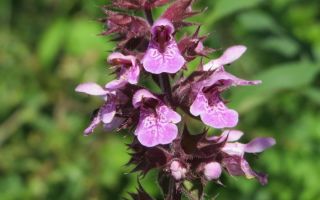Content
The medicinal properties of Pikulnik ordinary are used for inflammatory diseases and ailments of the respiratory system. The beneficial herb fights bacteria and infections, facilitates expectoration and, when consumed in moderation, strengthens the body's immune resistance.
What it looks like and where it grows
The common pickle (Galeopsis tetrahit) is an annual plant of the Lamiaceae family. It has a straight stem up to 50 cm above ground level, strongly branched and covered with hard fibers. The leaves of the plant are pubescent, oblong-ovoid, with a pointed end and serrate along the edge. On the stem, the plates are arranged in opposite order.
In July and August, the common pickle grows small purple buds up to 1.5 cm in length. The calyx of the flowers is five-pronged, prickly, and a white pattern is visible on the lower lip of the corolla.
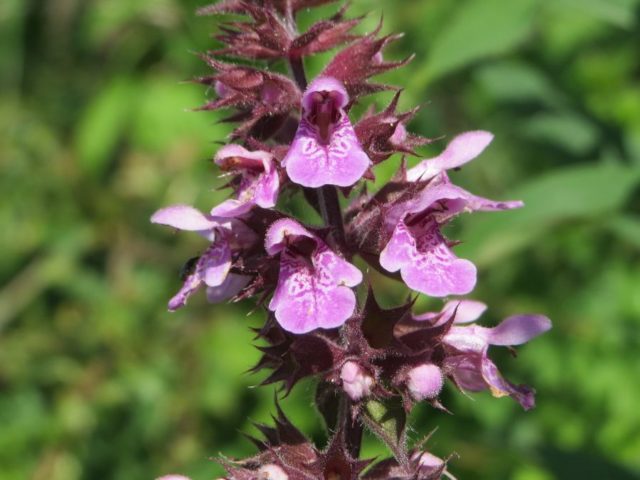
The herb culture is widespread in Central Europe, in the middle zone in Russia, and also in the south of Siberia. It grows most often in wastelands and forest clearings, it is found on roadsides, peatlands, in vegetable gardens and fields. Reacts well to close proximity to groundwater.
Chemical composition
The benefits and harms of pickle are of interest to traditional medicine due to the rich composition of the plant. The green parts of the annual herb contain:
- tannins;
- resins and bitterness;
- flavonoids;
- sterols;
- iridoids;
- fixed oils;
- saponins and tannins;
- salicylic and ascorbic acids;
- essential oils;
- wax;
- silicic and caffeic acids.
The vitamin composition gives the plant numerous medicinal properties. An ordinary pickle improves the condition both in acute ailments and in chronic disorders.
The medicinal properties of the pickle
An ordinary pickle in folk medicine is used to treat numerous ailments. In particular, a beneficial plant:
- improves the condition of tuberculosis;
- increases the strength and elasticity of the connective tissue of the lungs;
- accelerates the elimination of toxins and toxins from the body;
- liquefies phlegm and promotes expectoration;
- improves the condition of the spleen and liver;
- prevents the development of oncological diseases, especially leukemia;
- helps fight inflammation and infections;
- strengthens the body's immune resistance;
- normalizes digestion and promotes better absorption of nutrients;
- has an analgesic effect;
- stimulates appetite;
- prevents the development of anemia and vitamin deficiency.
Outwardly, means based on an ordinary pickle are used to treat skin diseases - psoriasis, boils, dermatitis. Decoctions and infusions of the plant, when applied to damaged areas, promote rapid tissue healing.
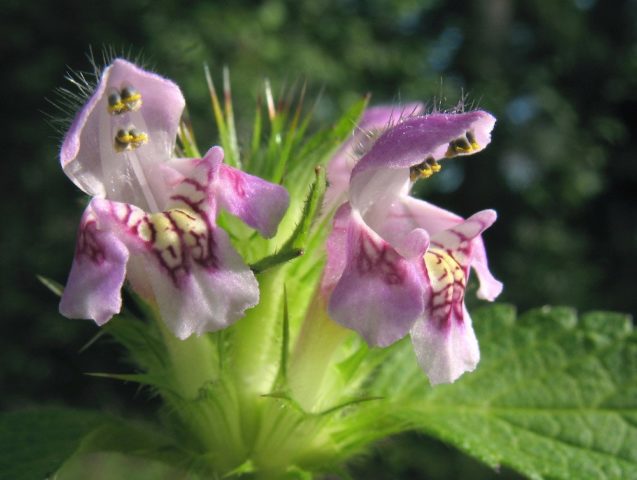
Application in traditional medicine
Traditional medicine suggests preparing infusions, decoctions and strong tinctures on the basis of a medicinal plant. When consumed according to proven recipes, piculnik improves well-being and promotes health.
With asthma
An aqueous infusion of common pickle has a beneficial effect on the respiratory system and reduces the frequency of asthma attacks. The drug is done as follows:
- Two large tablespoons of dry herb are crushed.
- Steam 500 ml of boiling water.
- Place on the stove over low heat for 15 minutes.
- Insist under the lid until it cools.
A filtered drug based on an ordinary pickle should be consumed 1/3 cup up to four times a day. In total, treatment continues until the condition normalizes.
With bronchitis
In acute and chronic bronchitis, a strong tincture of piculnik is beneficial. It has good warming properties, thins phlegm and fights bacterial processes in the airways. They do it according to the following algorithm:
- 15 g of dry herbs are poured into a glass container.
- Pour raw materials with 200 ml of high-quality vodka or alcohol, diluted to 40%.
- Close and put away in a darkened cabinet for two weeks.
- During the infusion, the product is regularly shaken.
After the expiration of the period, the agent from an ordinary pickle is filtered. You need to use it for treatment three times a day, 20 drops, the medicine is preliminarily diluted in a small amount of pure water.
With anemia
Vitamins and minerals in the composition of an ordinary pickle increase the level of hemoglobin, prevent the development of vitamin deficiency and replenish the reserve of strength. With anemia, traditional medicine advises to prepare tea with a plant in milk. The recipe looks like this:
- Dry grass is crushed and 5 g of medicinal raw material is measured.
- The stems and leaves of the plant are brewed with 250 ml of hot milk.
- Cover and leave for two hours.
The finished strained product must be divided into four servings and taken during the day on an empty stomach. Treatment continues for an average of two weeks, during which time the state of health should improve.
For diseases of the spleen
The anti-inflammatory properties of common pickle help relieve exacerbations of spleen ailments, improve digestion and eliminate pain. The following decoction is prepared for treatment:
- Dry stems and leaves are crushed in an amount of 30 g.
- Pour 500 ml of hot water.
- Boil the product over low heat for a quarter of an hour.
- Cool closed and filtered.
Ready-made pickle decoction should be taken twice a day, morning and evening, 50 ml.
With pyelonephritis
The healing properties of the common pickle help with kidney inflammation and normalize urination. Traditional medicine advises to brew such tea for medicinal purposes:
- The grass is crushed in a volume of 5 g.
- Pour a glass of hot, but not boiling water and leave for an hour under the lid.
- Pass the product through cheesecloth and add 5 g of natural honey.
- Stir well.
You need to take tea in half a glass twice a day.
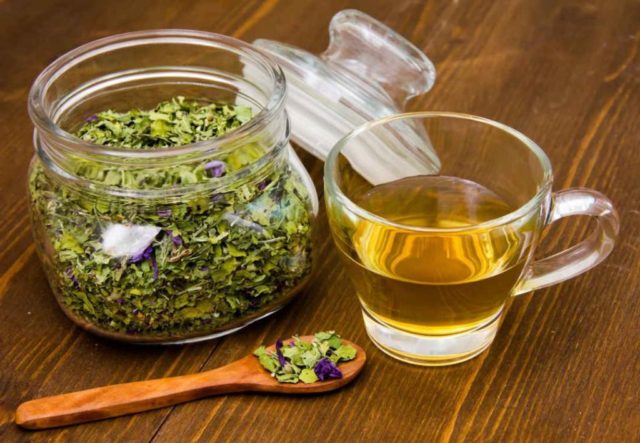
With cystitis
Healing piculic improves the condition of cystitis in women and eliminates pain. The drug at home is done as follows:
- 15 g of dry plant is poured into a teapot.
- Pour 250 ml of hot liquid.
- Leave in the closed form for a quarter of an hour.
- When ready, filter and add a small spoonful of honey.
The healing infusion should be divided into two portions and drunk during the day - morning and evening on an empty stomach.
With abscesses
Ordinary pickle effectively fights abscesses, boils and suppurations. The plant is used for compresses according to the following algorithm:
- Fresh leaves and stems of the plant are washed in cool water.
- Raw materials are twisted in a meat grinder or passed through a blender.
- The resulting green mass is abundantly applied to a gauze bandage.
- Apply to a sore spot and secure with a bandage.
Keep the compress on the skin for an hour. The procedure is repeated several times a day until the suppuration is completely resorbed.
With renal failure
Ordinary pickle can be used for kidney dysfunction to normalize urination and eliminate small stones. The following collection is prepared for therapy:
- 10 g of dried pickle is mixed with an equal amount of horsetail.
- Add 20 g knotweed.
- Measure out two large spoons of the medicinal collection.
- Pour 250 ml of warm water.
- Leave under the lid for six hours, then filter.
You need to take the product in 100 ml up to five times a day.
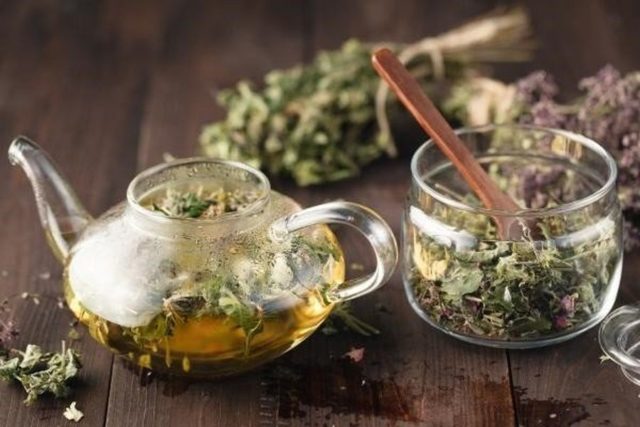
With tuberculosis
The common pickle has a good effect on the lungs with tuberculosis, improves the functioning of the respiratory system and helps to avoid complications. For treatment, prepare the following infusion:
- 20 g of ordinary pickle is mixed with an equal amount of bird knotweed.
- Add 20 g of horsetail and chopped primrose root each.
- Measure 50 g of a multi-component healing mixture and pour 500 ml of boiling water.
- Leave covered for 15 minutes.
The finished product must be filtered from plant sediment. Drink infusion up to five times a day, 100 ml.
With whooping cough
The expectorant properties of the common pikulnik help with the debilitating dry cough caused by whooping cough. Traditional medicine recommends using this recipe:
- Dry pickle grass is crushed in the volume of two small spoons.
- Pour boiling water over the raw materials and cover with a lid for ten minutes.
- Pass the finished tea through cheesecloth.
You need to drink a medicine from a pickle daily in a glass up to three times a day. If desired, it is allowed to add a little honey to the drink, it will soften the irritated throat.
For wounds and cuts
Fresh leaves and stems of common pickle can be used to disinfect the skin and quickly heal lesions. The application scheme looks like this:
- The collected raw materials are loaded into a blender.
- Crushed to a state of gruel.
- Press the resulting mass through folded gauze.
In the green juice of an ordinary pickle, you need to moisten a cotton pad or napkin and apply it to the sore spot for an hour. The top of the applique should be secured with a bandage. For quick healing, it is recommended to repeat the procedure twice a day.
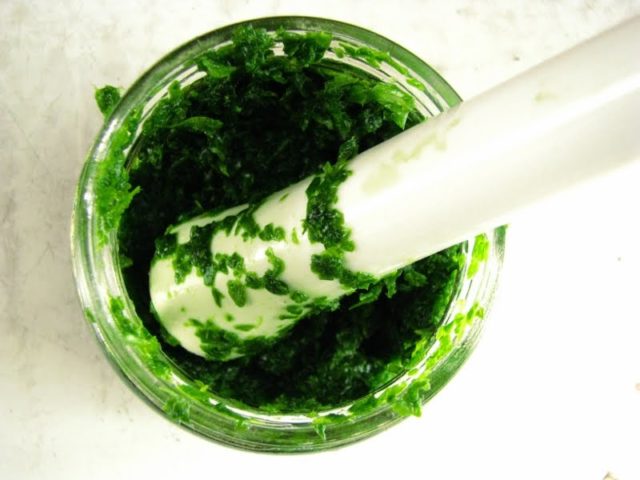
Contraindications
An ordinary pickle, with all its benefits, is capable of causing harm to the body. The plant contains some toxic components that make it potentially dangerous. It is impossible to use herbal decoctions and infusions:
- during pregnancy and lactation;
- in childhood and adolescence;
- with individual allergies;
- with a tendency to seizures.
During treatment with an ordinary pickle, it is important to observe the dosages indicated in the prescriptions. If safe volumes are exceeded, the plant provokes side effects - muscle pain, nausea, dizziness, fainting.
Collection and procurement
For medicinal purposes, the aboveground parts of an ordinary pickle are harvested - stems, buds and leaves. It is necessary to collect the plant during the flowering period before the appearance of the seed pods, when the most useful substances in the greenery are present. For healing raw materials, they go to an ecologically clean place, located at a distance from busy highways and industrial facilities.
The stems of an ordinary pikulnik with leaves and flowers are cut with a sharp knife at the very surface of the earth. Upon returning home, the raw materials are sent for drying, laid out on a baking sheet under a canopy, or tied in bundles and hung in a warm and ventilated place. The workpieces should not be exposed to direct rays of the sun, since the valuable substances in the composition of the grass in this case are destroyed. The dried parts of the plant are poured into paper bags and sent to storage in a dark place.
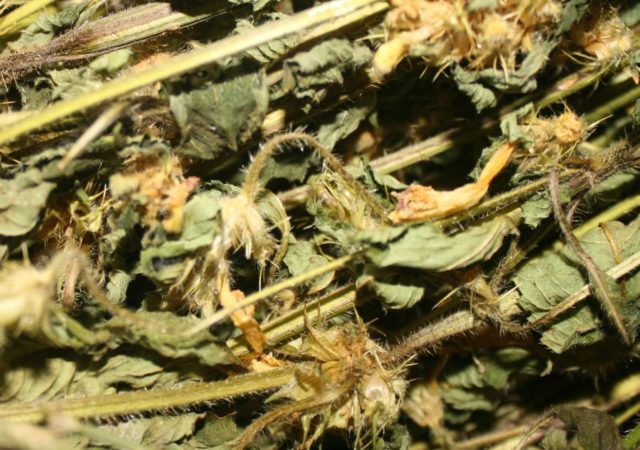
Conclusion
The medicinal properties of the common pickle are used mainly for colds, accompanied by a strong cough. Also, the plant improves the condition with ailments of the kidneys and excretory system. The herb has few contraindications, but when used, you still need to adhere to the dosages.
Reviews on the benefits of herb pickle

